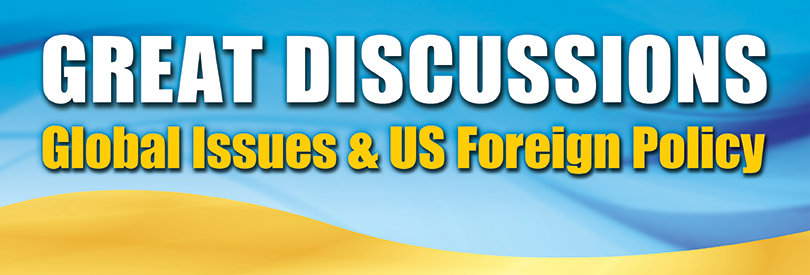October 10th, 2017 by pio@shoreline.edu
Compassion, Culture, and Education about Syria: PUB 9208
Thurs., Oct. 12: 12:30-1:30pm
Speaker: Rita Zawaideh, Founder, Salaam Cultural Museum/Syrian Medical Missions
Presented by the GAC: This unique non-profit organizes medical teams that travel to Syrian refugee camps in Jordan and Greece. They also collect clothing, furniture, household effects, and medical supplies for refugees in these camps, as well as those who have resettled in Washington State. The desire to help others transcends politics, religion, and sectarian tensions. Rita also has advice for those of us who want to help. Click here for more info.
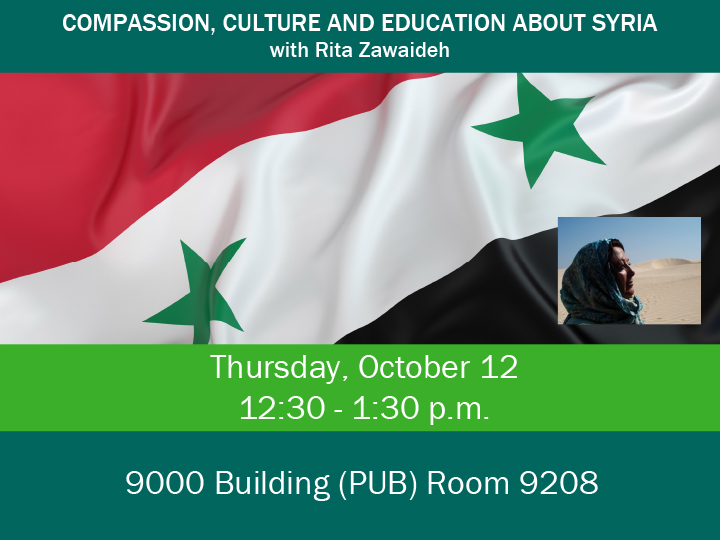
Posted in Announcements, Events, Free Tagged with: gac, Rita Zawaideh, Salaam Cultural Museum, Syria, Syrian Medical Missions
April 14th, 2016 by pio@shoreline.edu
Here are the events happening around campus for Thurs., April 14.
Intramural Zumba, Athletics Room 3025
Thurs., April 14: 12:35-1:25 p.m.
Free to all Shoreline Community College students, faculty, and staff.
Artist’s Reception – Painting by Molly Magai, Admin (1000) bldg. gallery
Thurs., April 14: 4-6 p.m.
![MOLLY MAGAI Poster-email[5]](http://i0.wp.com/sccdaag.files.wordpress.com/2016/03/molly-magai-poster-email5.jpg?zoom=2&w=600&ssl=1)
Molly Magai makes paintings of landscapes dominated by cities, roads, industry, and the living things that inhabit them. These structures, created for human convenience, are very much in conflict with nature. They are also an awe-inspiring human accomplishment, the work of generations of builders and engineers. Most of us ignore these landscapes as we pass by them. Magai’s job as a genre painter is to make you see them, in their destructiveness and their beauty.
Magai make paintings based on snapshots she takes from a moving vehicle. Handicapped by the car’s speed, the camera creates inadvertent effects – unexpected colors, halos, and blurs. She is interested in the sensation of speed, and the way the image is filtered first through the camera, the painter, and the painting.
Intramural Personal Training, Athletics room 3007
Thurs., April 14: 6:05-6:50 p.m.
Free to all Shoreline Community College students, faculty, and staff.
Great Discussions Series: The Middle East, Room 1010(M)
Thurs., April 14: 6:30-8 p.m.
Part of the Great Discussions series. Part of an 8-part series, *registration is required. For more information go to the GAC website, or contact Larry Fuell (lfuell@shoreline.edu, 206-533-6750) or Elouiessa Muana (emuana2@shoreline.edu, 206-546-6996.
*Attending individual seminars is possible, if space available; contact Larry Fuell. $5 entrance fee collected at door.
Posted in Announcements, Events, Free, Workshops Tagged with: art gallery, gac, gallery, global affairs center
March 22nd, 2016 by pio@shoreline.edu
Enrollment is limited. Click Here to Register Now!
What better way to (re)think about the world and America’s role than to share thoughts with friends and neighbors about some of the hottest foreign policy issues confronting the United States today. This series, utilizing Foreign Policy Association materials, will meet each Thursday evening for eight weeks, starting April 7 through May 26.
Topics we will discuss include:
- Middle East, April 7
- The Rise of ISIS, April 14
- Climate Change, April 21 **will take place in Room 9208 (Quiet Dining Room), and start at 7:00 pm, as part of a discussion about Biofuels and Climate Change
- The Future of Kurdistan, April 28
- Migration, May 5
- The Koreas, May 12
- The United Nations, May 19
- Cuba and the U.S., May 26
Students can receive credit for participating!! See below.
For more information go to the GAC website, or contact Larry Fuell (lfuell@shoreline.edu, 206-533-6750) or Elouiessa Muana (emuana2@shoreline.edu, 206-546-6996
*Attending individual seminars is possible, if space available; contact Larry Fuell. $5 entrance fee collected at door.
Issue brief summaries:
Middle East (April 7)
From a proxy war in Yemen to an ongoing civil war in Syria, a number of ongoing conflicts have shaken the traditional alliances in the Middle East to their core. As alliances between state and non-state actors in the region are constantly shifting, the U.S. has found itself between a rock and a hard place. In a series of conflicts that are far from being black-and-white, what can the U.S. do to secure its interests in the region without causing further damage and disruption?
The Rise of ISIS (April 14)
Born out of an umbrella organization of Al Qaeda in Iraq, the Islamic State in Iraq and Syria (ISIS) burst onto the international stage after it seized Falluja in December 2013. Since then, the group has seized control of a number of critical strongholds in the country and declared itself a caliphate, known as the Islamic State. Still, the question remains: What is ISIS, and what danger does it pose to U.S. interests?
Climate change (April 21)** Note: this discussion will take place in 9208, starting at 7 p.m.
In the past few years, the American public has become more aware of the damage wrought by climate change. From droughts in the west to extreme weather in the east, a rapidly changing climate has already made its footprint in the United States. Now, it’s expected that the presidential election in 2016 will be one of the first ever to place an emphasis on these environmental changes. What can the next president do to stymie this environmental crisis? And is it too late for these efforts to be effective?
The Future of Kurdistan (April 28)
Kurdistan, a mountainous region made up of parts of Turkey, Iraq, Iran, Armenia and Syria, is home to one of the largest ethnic groups in West Asia: the Kurds. Now, most in the West know them for their small, oil-rich autonomous region in northern Iraq called Iraqi Kurdistan — one of the U.S.’ closer allies in the Middle East and a bulwark against the expansion of the so-called Islamic State. What does the success of Iraqi Kurdistan mean for Kurds in the surrounding region?
Migration (May 5)
As a record number of migrants cross the Mediterranean Sea to find refuge in Europe, the continent is struggling to come up with an adequate response. Although Europe’s refugees are largely fleeing conflicts in Syria, Iraq and parts of Africa, their struggle is hardly unique. Today, with the number of displaced people is at an all-time high, a number of world powers find themselves facing a difficult question: How can they balance border security with humanitarian concerns? More importantly, what can they do to resolve these crises so as to limit the number of displaced persons?
The Koreas (May 12)
At the end of World War II, Korea was divided in two. The northern half of the Korean peninsula was occupied by the Soviet Union, the southern by the United States. Today, North and South Korea couldn’t be further apart. The North is underdeveloped, impoverished and ruled by a corrupt, authoritarian government, while the South advanced rapidly to become one of the most developed countries in the world. With such a wide gap, some are asking if unification is possible, even desirable, anymore?
The United Nations (May 19)
On the eve of the international organization’s 70th birthday, the United Nations stands at a crossroads. This year marks a halfway point in the organization’s global effort to eradicate poverty, hunger and discrimination, as well as ensure justice and dignity for all peoples. But as the UN’s 193 member states look back at the success of the millennium development goals, they also must assess their needs for its sustainable development goals — a new series of benchmarks, which are set to expire in 2030. With the appointment of the ninth secretary-general in the near future as well, the next U.S. president is bound to have quite a lot on his or her plate going into office.
Cuba and the U.S. (May 26)
The U.S. announced in December 2014 that, after decades of isolation, it has begun taking major steps to normalize relations with Cuba, its neighbor to the south. The announcement marks a dramatic shift away from a policy that has its roots in one of the darkest moments of the Cold War — the Cuban missile crisis. Although the U.S. trade embargo is unlikely to end any time soon, American and Cuban leaders today are trying to bring a relationship once defined by a crisis in the 1960s into the 21st century.
Posted in Announcements, Events, Workshops Tagged with: gac, global affairs center, great discussions
February 24th, 2016 by pio@shoreline.edu
These are the events happening around campus for Thurs., Feb. 25.
Social Science Open House, Room 1402
Thurs., Feb. 25: 12:30-2:30 p.m.
 Come meet Social Science faculty in a friendly, low-pressure environment outside the classroom. Students will interact with faculty to learn more about the Social Sciences, hear about exciting upcoming classes before Spring Registration and create an educational plan for the rest of your quarters here at Shoreline. Personalized attention, helpful information about future pathways, and snacks included…this open house has something for everyone!
Come meet Social Science faculty in a friendly, low-pressure environment outside the classroom. Students will interact with faculty to learn more about the Social Sciences, hear about exciting upcoming classes before Spring Registration and create an educational plan for the rest of your quarters here at Shoreline. Personalized attention, helpful information about future pathways, and snacks included…this open house has something for everyone!
Celebrating Food and Wellness around the World, PUB 9208
Thurs., Feb. 25: 12:30-1:30 p.m.
During the summer of 2015, Alison Leahy, Nutrition/Dietetic Faculty, and Amy Rovner, eLearning Support, conducted a MOOC (Massive Online Open Class) that celebrated food and its relationship to wellness, focusing on a global approach. Over 1300 participants investigated culinary and dietary practices from six regions around the world, looking at the correlation and interconnections between food and health.
Join us to discuss the class, what they learned, and plans to host the class again in the future.
For more info about the guest speakers, visit our biographies page.
All About WOIS: Washington’s career research tool! Computer Lab 1302
Thurs., Feb. 25: 12:30-1:30 p.m.

Learn more about one of Washington’s greatest secrets … WOIS!
Learn to use WOIS/The Career Information System to explore careers, create goals for your future, make educational plans to reach your goals, and find the training programs and the right schools to help you achieve your dreams.
Whether you are ready to find a job right now, or you want to make a plan for more education and future employment, WOIS has the exploration and planning tools for YOU!
Workshop is open to all and no RSVP needed.
Questions about the workshop? Contact Sheryl Copeland at scopeland@shoreline.edu or 206.533.6712.
Intramural Zumba, Athletics 3025
Thurs., Feb. 25: 12:35-1:25 p.m.
Take time out from your busy day to dance your way fit. Free to students, faculty, and staff.
Tackling Procrastination and (a lack of) Motivation, PUB 9208
Thurs., Feb. 25: 1:30-2:30 p.m.

Part 3 of the Time Management Series:
Do you find yourself busy doing things you don’t need to do in order to avoid the things you are actually supposed to be doing? Do you want to create some goals to help guide how you are spending your time? Come learn some strategies for tackling procrastination and increasing motivation!
*This session will be recorded and posted online. To view go to our website:www.youtube.com/user/ShorelineCCvideos
SCC Art Gallery Artist’s Reception with Andrew Fallat, Art Gallery (1000 bldg.)
Thurs., Feb. 25: 5-7:30 p.m.

Join us for an artist’s reception with Andrew Fallat to celebrate his solo show: “The Banal in the Age of Mechanical Reproduction.” The show is housed in the Admin bldg (1000) art gallery now through March 4.
The reception celebration will include collaboration with English and Writing students from Shoreline Community College, who will share writing inspired by Fallat’s work at the reception.
About the show:
Through the exploration of kinetic systems and phenomena, Andy Fallat’s work focuses on the condensation of a narrative into an three dimensional object. Building machines and sculptures that are slightly above human scale, he calls attention to our place within a system. Fallat creates creatures and interactive situations with industrial and classically sculptural processes that question our relationships to them and each other.
The work presented in this exhibit is a series of sculptures and low reliefs. They are machines that imitate life. The hope, fear, and complexity that Fallat finds on walks around his neighborhood. It is a shrub as potent as its cousin the mighty spruce. They are lines that become form and patterns that mute shape. It is what happens when two things point to the same mark.
Intramural Personal Training, Athletics bldg., room 3007
Thurs., Feb. 25: 6-6:50 p.m.
Come get free, hands-on training to help you reach your fitness goals.
Posted in Announcements, Arts & Entertainment, Events, Free, Workshops Tagged with: art gallery, gac, intramurals, success series, time management
February 17th, 2016 by pio@shoreline.edu
These are the events happening around campus Thurs., Feb. 18.
Intramural Zumba
Athletics building, room 3025, 12:35-1:25 p.m.
Take time out from your busy day to dance your way fit. Free to students, faculty, and staff.
Tools, Tips, Tricks, and Technology: Part 2 of the Time Management Series
PUB 9208, 1:30-2:30 p.m.
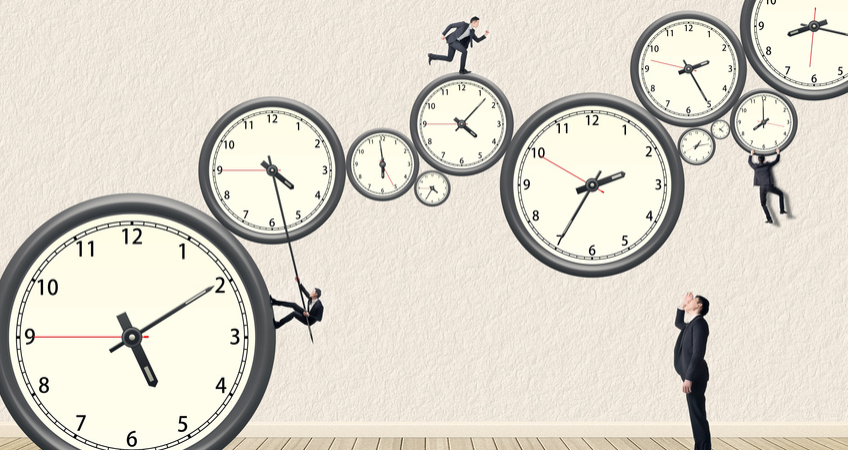
Technology has made thousands of apps available to us in order to help with scheduling and organization. Come learn about some of the most popular apps used by students. In addition, we will be exploring Google Calendar (which you have for FREE with your Shoreline e-mail address) and its features to set you up for success. Bring a laptop if you want!
*This session will be recorded and posted online. To view go to our website:www.youtube.com/user/ShorelineCCvideos
UW Dentistry Info Session
Room 2812, 1:30-2:30 p.m.
This is a presentation by Memory Brock, Assistant Director of Admissions at the U of Washington School of Dentistry. Learn how to prepare and apply to dental school! Everyone is welcome.
UW Foster School of Business Transfer Information Session
PUB 9208, 3-4 p.m.
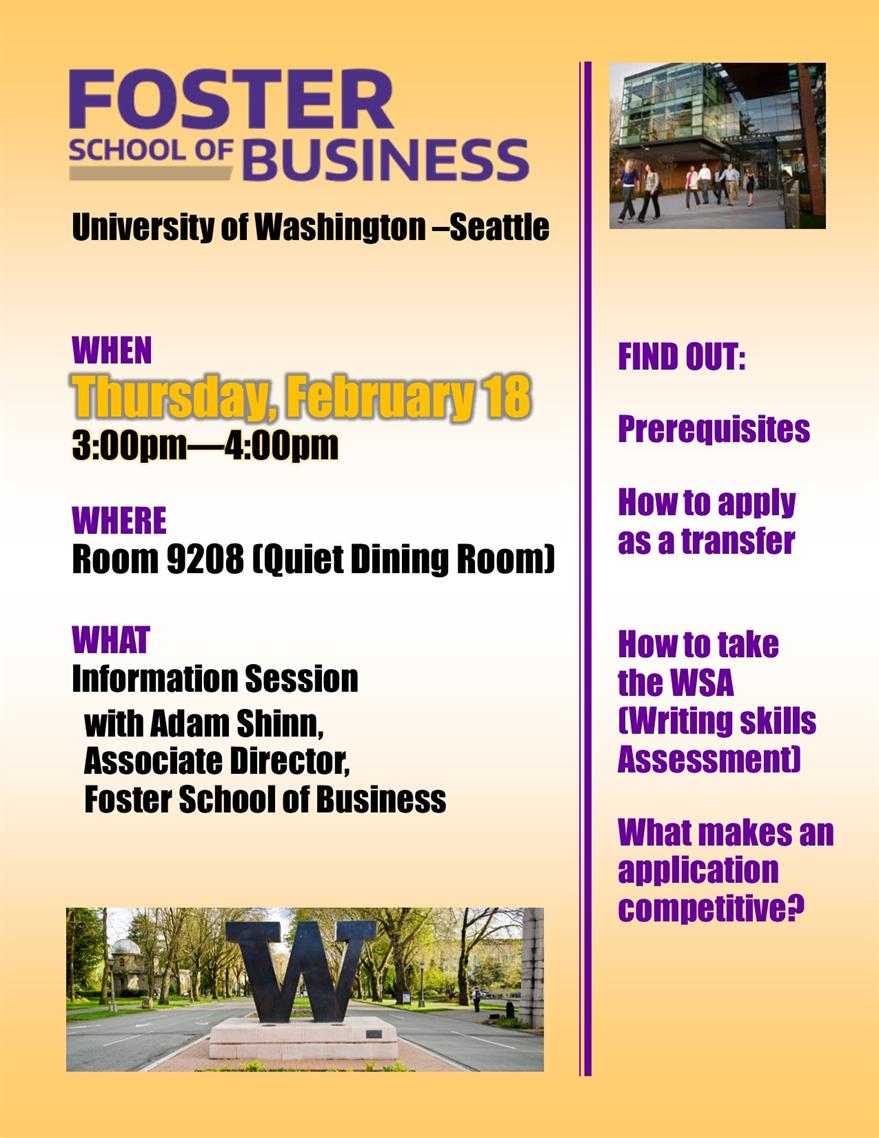
Adam Shinn, Associate Director at the UW Foster School of Business, will be here on campus to give an information session on transferring to Foster. He will answer students’ questions regarding prerequisites, how to apply, how to take the Writing Skills Assessment (WSA), and what makes an application competitive. Open to all students.
Intramural Personal Training
Athletics bldg. room 3007, 6-6:50 p.m.
Come get free, hands-on training to help you reach your fitness goals.
The GAC Presents: China’s Urbanization and the “Left-behind” Children
PUB 9208, 7-8:30 p.m.
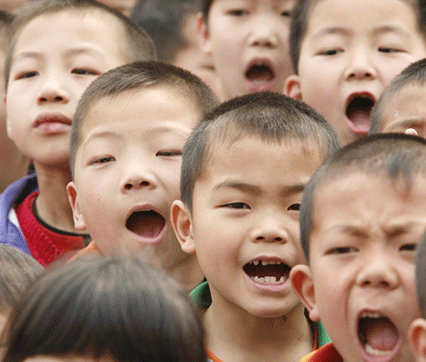
In China, a new generation of children is growing up in the countryside with only one or no parent around during most of the time of the year. They are called “left-behind children.” Their population has grown to more than 60 million; half of them are between age 6 and 14. They are left behind because their parents have gone to work in the city, often hundreds of miles away from home. They are part of China’s gargantuan army of migrant workers, estimated at about 170 million in 2014. These laborers power China’s economic machine and turn it into the “world’s factory’. While they work in the city, their children often cannot be with them. Lacking day-to-day parental care and close guidance, the “left-behind” children face many problems and many of them get into trouble. Some develop psychological problems; others fall victims to bullying, physical or sexual abuse, or even serious accidents.
This presentation explains how China’s special, “incomplete” urbanization policy and thehukou (household registration) system function in concert to produce a generation of “left-behind” children and “migrant children,” and their implications.
Join us, together with Kam Wing Chan, Geography Department, University of Washington, discuss about the difficulties the “left-behind children” of China faces. To learn more about our speaker. visit our biographies page.
Posted in Announcements, Events, Free, Workshops Tagged with: campus events, gac
February 1st, 2016 by pio@shoreline.edu

The Global Affairs Center Presents: Political and Economic Changes In Myanmar (Burma) Wed., Feb. 3 from 7-8:30 p.m. in the PUB Quiet Dining Room (9208).
Myanmar (Burma) is undergoing significant political and economic reforms. On November 8, 2015, The National League for Democracy, led by Daw Aung San Suu Kyi (who was under house arrest from 1989 to 2010), won a stunning nationwide election, defeating a military establishment that has ruled Myanmar since 1962. The country’s election commission announced that the party had won 348 seats, enough for a majority in Parliament, and well more than the 40 won by the ruling (military) party. Yet the military will continue to hold many levers of power, suggesting that a complex dance between entrenched interests and the will of the people is the new reality.
The Republic of the Union of Myanmar, formerly known as Burma (until 1989), is the second largest country in Southeast Asia and boasts a population of more than 50 million. Myanmar emerged from British colonial rule in 1948, and has remained under military control since General Ne Win overthrew the civilian government in a 1962 coup. The country’s modern history has been marred by persistent human rights violations, ethnic strife, cronyism and failed state-run economic management that has resulted in widespread poverty.
Join our discussion about Myanmar’s political and economic changes, together with Larry Dohrs, Chairman, U.S. Campaign for Burma.
For more information about Larry Dohrs, visit our biographies page.
Posted in Announcements, Events, Free, Workshops Tagged with: gac, global affairs center, larry dohrs, myanmar
November 17th, 2015 by pio@shoreline.edu

Join us Wed., Nov. 18 from 12:30-1:30 p.m. in the PUB Quiet Dining Room (9208) for a talk by Shoreline’s own Prof. Diana Knauf titled “Cambodia: A Country of Contradictions.”
For most, Cambodia evokes one of two striking images; the majesty of the ancient Ankor Wat or the Killing Fields of the Khmer Rouge era (1975-1979). Come expand your view of this beautiful, sometimes historically troubled and now quickly developing country – there is far more about Cambodia worth knowing.
As with most nations, issues abound: Socio-economic imbalances exist between rural and urban areas, and when combined with the lack of opportunities for employment, education, and safe-migration, issues such as human trafficking arise. Nongovernmental organizations may have sincere hopes of helping, but are they effective? How can one move forward in our fast paced world and yet still protect rich cultural traditions and the environment? In a country determined to move beyond the recent historical events, things move awfully fast, sometimes at a cost to the environment and to its citizens.
Diana Knauf has made two trips to Cambodia (most recently this summer) where she spoke with experts and observed first-hand the beauty and troubles of Cambodia. Join us in discussing this country of contradictions with her. For more information about Dr. Knauf, visit our biographies page.
Posted in Announcements, Events, Free Tagged with: diana knauf, gac, global affairs center
November 11th, 2015 by pio@shoreline.edu

Join us Thurs., Nov. 12 at 7 p.m. in the PUB Quiet Dining Room (9208) for a talk by James Hill, Consul General, Canada. This event is free and open to the public.
The United States and Canada share two borders and their bilateral relationship is one of the closest and most extensive in the world. It is reflected in the high volume of bilateral trade–more than $2 billion a day in goods and service; the fact that the two countries have one of the world’s largest investment relationships; and in people-to-people contact–about 300,000 people cross between the countries every day. In fields ranging from security and law enforcement to environmental protection to free trade, the two countries work closely together on multiple levels, from federal to local.
Canada and the U.S. cooperate on continental defense, transboundary environmental and water issues, and on international high seas governance initiatives. They are both founding members of the Arctic Council. They are both members of numerous multilateral political, military, and economic fora, including the United Nations, NATO, WTO, NAFTA, G7, G20, the Organization for Security and Cooperation in Europe, the Organization for Economic Cooperation and Development, the Organization of American States, and the Asia-Pacific Economic Cooperation forum.
But do they see eye to eye on every international issue? There is a tendency of Americans to take Canada for granted – “they are just like us, aren’t they?” While the two nations do share many basic values and cooperate in many spheres, Canada does have interests and perspectives that at times are at odds with the United States.
Join us in exploring Canada’s worldview with the current Consul General of Canada in Seattle, James Hill. See more details on Consul Hill.
For photos, visit and LIKE our Facebook page.
For more info, click here.
Posted in Announcements, Events, Free Tagged with: gac, global affairs center
November 10th, 2015 by pio@shoreline.edu

Join us Thurs., Nov. 12 at 7 p.m. in the PUB Quiet Dining Room (9208) for a talk by James Hill, Consul General, Canada. This event is free and open to the public.
The United States and Canada share two borders and their bilateral relationship is one of the closest and most extensive in the world. It is reflected in the high volume of bilateral trade–more than $2 billion a day in goods and service; the fact that the two countries have one of the world’s largest investment relationships; and in people-to-people contact–about 300,000 people cross between the countries every day. In fields ranging from security and law enforcement to environmental protection to free trade, the two countries work closely together on multiple levels, from federal to local.
Canada and the U.S. cooperate on continental defense, transboundary environmental and water issues, and on international high seas governance initiatives. They are both founding members of the Arctic Council. They are both members of numerous multilateral political, military, and economic fora, including the United Nations, NATO, WTO, NAFTA, G7, G20, the Organization for Security and Cooperation in Europe, the Organization for Economic Cooperation and Development, the Organization of American States, and the Asia-Pacific Economic Cooperation forum.
But do they see eye to eye on every international issue? There is a tendency of Americans to take Canada for granted – “they are just like us, aren’t they?” While the two nations do share many basic values and cooperate in many spheres, Canada does have interests and perspectives that at times are at odds with the United States.
Join us in exploring Canada’s worldview with the current Consul General of Canada in Seattle, James Hill. See more details on Consul Hill.
For photos, visit and LIKE our Facebook page.
For more info, click here.
Posted in Announcements, Events, Free, Workshops Tagged with: gac, global affairs center
November 2nd, 2015 by pio@shoreline.edu

Join the Global Affairs Center this Wed., Nov. 4 in the PUB Quiet Dining Room from 11:30 a.m. – 12:20 p.m. for a talk on Women and Social Protest.
• What role do women play in politics?
• What prompts women to organize on behalf of unpopular causes?
• How are women themselves changed by personal experiences of political activism?
Using both historical and contemporary examples from the U.S. and other countries, Shoreline Community College’s own Professor Rachel David will discuss answers to these and other questions. For more information about Ms. David, visit our biographies page here.
Posted in Announcements, Events, Free, Workshops Tagged with: gac, rachel david

![MOLLY MAGAI Poster-email[5]](http://i0.wp.com/sccdaag.files.wordpress.com/2016/03/molly-magai-poster-email5.jpg?zoom=2&w=600&ssl=1)
